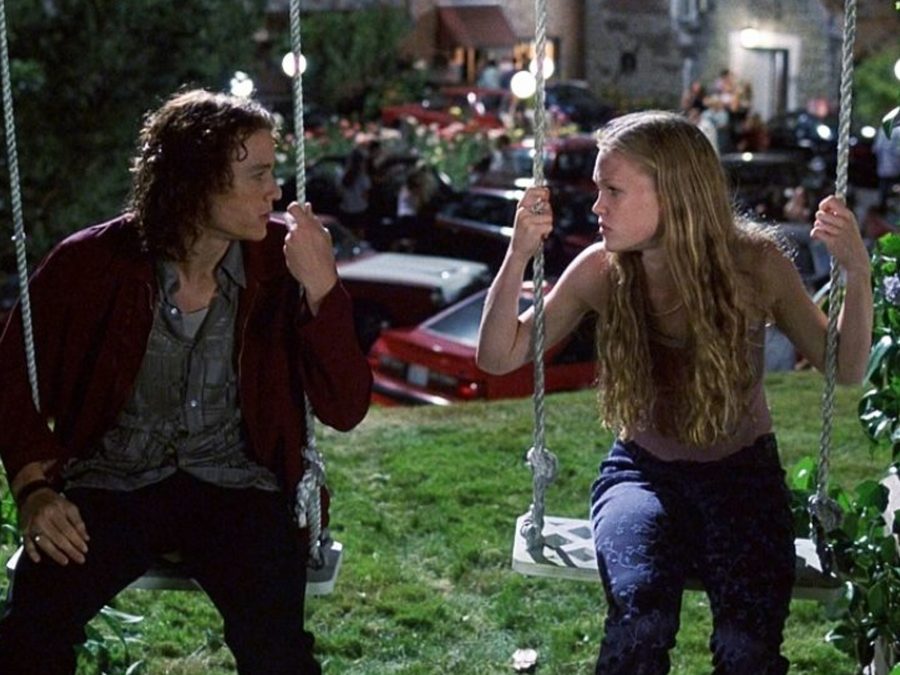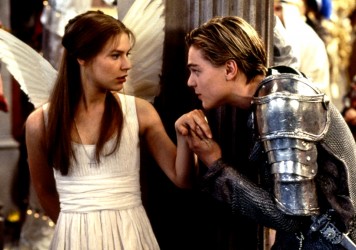
Ask any English teacher and they’ll tell you that convincing a classroom of teenagers to care about Shakespeare if they aren’t already predisposed to theatre is an uphill battle. A bunch of adults dressed in period outfits, speaking a barely recognisable version of English does little to entice a classroom of bored teens. But if you swap the stage for a screen and trade the formidable seriousness of RSC-trained actors for a cast of bright young things, suddenly their interest is piqued.
When 10 Things I Hate About You was released in 1999, no one could have predicted that 25 years later the film would still be fondly remembered as one the best modern-day adaptations of a Shakespeare play. Loosely based on The Taming of the Shrew, the story of a loveable rogue softening the heart of an embittered female lead delighted audiences and launched Julia Stiles and Heath Ledger into superstardom, following the trend of teen-film-as-star-vehicle set by Baz Luhrmann in 1996 with the release of Romeo + Juliet.
When Luhrmann swapped fair Verona for Venice Beach, California (with gaudy floral shirts and frosted tips to match) he captured the attention of teenagers worldwide, creating what was dubbed ‘Shakespeare for the MTV generation’. The film very quickly became a staple in high school classrooms, and the role that it played in cementing Leonardo DiCaprio as the heartthrob of his generation is undeniable. In much the same way, Heath Ledger’s cheeky smile and effortless charm as rebel-without-a-cause Patrick Verona made him a certified Hollywood heartthrob, and what followed was a decade of filmmakers trying (and failing) to recreate that same magic.
The turn of the century brought with it an onslaught of modern-day Shakespeare adaptations, all of which met varying levels of success. In 2001, Miramax released Get Over It (loosely based on A Midsummer Night’s Dream) while Lionsgate had O (a high school basketball take on Othello, also starring Julia Stiles, which had been pushed back from a 1999 release due to the Columbine tragedy). 2006 gave us not one but two Shakespeare adaptations in the form of John Tucker Must Die (loosely based on The Merry Wives of Windsor) and She’s the Man (inspired by Twelfth Night and written by the same writers of 10 Things). While the last two films were minor box office successes, these films failed to achieve the critical success of Romeo + Juliet or 10 Things I Hate About You, resulting in Hollywood taking an extended break from modernised Shakespeare adaptations for the better part of 20 years.
Then came 2023’s Anyone But You. Loosely inspired by Much Ado About Nothing, the film found an audience amongst both Shakespeare aficionados and those yearning for an alternative to the franchise tent poles that have dominated the multiplexes over the past ten years. As a result, Will Gluck’s charming film became an unlikely runaway box office hit and earned the title of highest-grossing live-action adaptation of a Shakespeare play, claiming over $200 million at the global box office.
Alas, the film’s financial success couldn’t shield it from the usual criticisms that plagued the Shakespeare adaptations of the early noughties, disappointing viewers who went in expecting a more faithful adaptation of the play and suffering from a weak script and predictable plot. Hoist by its own petard, the film may have failed to impress Shakespeare connoisseurs, but the surprising box office turnout proved that the appetite for modernised Shakespeare adaptations is still very much alive. But what exactly is the unique formula that has evaded filmmakers since 10 Things?

The success of Gil Junger’s film, written by Karen McCullah and Kirsten Smith, lies in its reverence for the text and genre, and in modernising the original text the film was able to remedy problematic aspects of the play. Where the play’s Katherina is manipulated into submission by suitor Petruchio, Stiles’ Kat Stratford remains firm in her feminist beliefs, even when she is being romanced. Kat is facetiously referred to as “the shrew” but isn’t made to compromise her ideals – rather it’s the other characters who must meet her in understanding. She is argumentative, but her anger is borne out of a deeply upsetting incident she experienced, therefore her stand-offish nature feels justified rather than misplaced. In its willingness to blend contemporary teen life with classic Shakespearean ideals, 10 Things elevates itself from a run-of-the-mill teen comedy with wit and charm, challenging the original text whilst still paying respect to the Bard.
It is through this process of modernisation that 10 Things sets itself apart from even Romeo + Juliet. Where Romeo + Juliet is modern in everything but speech, preserving the language of the play to create blended material perfect for high school essays, 10 Things is unabashedly a teen rom-com first and a Shakespeare adaptation second. It captures that specific, earth-shattering feeling of being young and in love – a core tenet of many Shakespearean plays and teen rom-coms alike – and that lightning-in-a-bottle magic of perfect casting and clever writing can’t be easily replicated without care for the genre. In 10 Things, teen love doesn’t feel frivolous or unimportant; when Kat breaks down in front of her class, admitting in despair that she can’t hate Patrick no matter how hard she tries, the moment feels as important as if we were watching a monologue delivered on stage. When Joseph Gordon-Levitt’s Cameron lifts a quote directly from the original play to exclaim “I burn, I pine, I perish!”, we believe in his sudden state of lovesick anguish.
Of course, the most memorable performance in the film comes from Ledger as charming brute Patrick Verona. When Patrick slides down a flagpole and dances his way across bleachers crooning along to Frankie Valli’s Can’t Take My Eyes Off Of You, you can practically hear the hearts of a million teenagers melting. Not many can pull off the public declaration of love, but in Ledger’s deft hands, a cringe-worthy display of public affection becomes an endearing moment for the romantic comedy history books. No one has quite managed to capture people’s hearts as quickly as Ledger did in 10 Things I Hate About You, and the utterly ridiculous image of him lighting a cigarette with a Bunsen burner and holding up a copy of The Feminine Mystique had a devastating impact on my psyche, the effects of which I’m still dealing with today. These moments don’t feel forced or contrived but are paid off by a strong script and fully realised performances from the cast.
A successful Shakespeare adaptation will last long in the minds of its audience and offer a way into the text without relying too heavily on rigid formulae or archaic language. As seasoned Shakespeare veteran Sir Ian McKellen once said, to fully understand a Shakespeare play it needs to be seen, not just read. True skill lies in being able to adapt these plays to pique the interest of a younger audience, and writers Smith and McCullah laid the blueprints with 10 Things – with a sprinkling of quotes from Shakespeare and a character who declares herself “involved” with the playwright, the film stands out as a strong Shakespeare adaptation. The lasting impact of 10 Things I Hate About You 25 years after its release and the recent financial success of Anyone But You proves that Shakespeare’s plays are still rife for interpretation – whether or not someone can make a film as memorable and sincere as 10 Things is another question entirely.
Published 2 Apr 2024

By Tom Bond
Twenty years ago Baz Luhrmann put a vital contemporary spin on this timeless romantic epic.

Twenty years on, Leonardo DiCaprio and Claire Danes are as irresistible as ever in this swooning melodrama.

As Heath Ledger and Julia Stiles taught us, being young isn’t about fitting in but forging your own path.